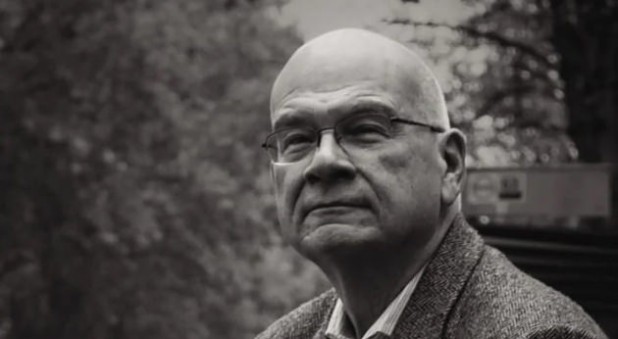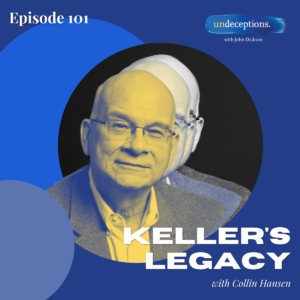“Keller, the most influential Christian apologist and evangelical leader of his generation died Friday at age 72.”
So reads the stand-first in an obituary in The Atlantic, published two days after the preacher, author, leader, and public intellectual Tim Keller passed away.
Few Christain thinkers in history have had an impact akin to Keller’s.
Having sold millions of books (some of which topped the New York Times bestseller list), preached thousands of sermons, and represented Christianity on the world stage hundreds of times, Keller established a legacy that his friend, mentee, and biographer Collin Hansen believes will put him in Christendom’s rarest company.
“I hope we at least remember him with the same fondness that we have for J.I. Packer or John Stott,” Collin said, speaking on the Undeceptions podcast.
“(However) it could be that as we look at the real differences that Keller made in terms of attitudes toward the city, toward the work of evangelism, and apologetics, we may see him as more of a longer-term figure, more like in the John Calvin or Jonothan Edwards category.
What no doub kick-started Keller’s legacy was his role in establishing a thriving church in the middle of secular Manhattan in the late 1980s.
Moving to the big apple from the blue-collar town of Hopewell, Virginia (where he served as small-town pastor), Keller’s decision to step into the leadership role at Redeemer Presbyterian in 1989 was written off by New York Magazine as “theological suicide”.
The congregants would be (it was hoped) New York professionals, living in one of the most secular cities on the planet.
Despite the naysayers, Keller’s approach to leadership – combining firm orthodoxy with grace and kindness – bore incredible results.
Yet by the end of its first year, Redeemer had 250 congregants, and three staff members working in administration.
Throughout the next decade that number would swell exponentially – pitching into the thousands by the turn of the millennium – with multiple new campuses planted throughout the city (there are currently five Redeemer Chruch sites in New York City).
Following his death, The New York Times declared that Keller had achieved “a modern miracle of his own – establishing a theologically orthodox church in Manhattan that attracted thousands of young professional followers”.
For Collin, this fruit was all down to Keller’s unique, cultured approach.
“The transforming experience that people had in the 1980s and 1990s at in New York with Redeemer Presbyterian Church was that they could be fully Christian but also love to be a part of the city” he said.
“Of course as a preacher (Keller) wants you to see Jesus more than anybody else, but he’s always drawing your attention toward this book that he read, and it could be a New York Times bestseller. It could be an article that he read in Village Voice. If he were still preaching a lot today, it would be some podcast that he listened to.”
Perhaps Keller’s finest hour (in the public eye) arrived on September 16, 2001 – a mere five days after the attack on the World Trade Centre.
On a normal Sunday at that time, Redeemer had a little under 3000 attendees. That day however, well over 5000 people came, with a line running down the street before doors opened. Keller added another one-off service to accommodate people who were seeking something after the tragedy.
Keller’s message that day drew primarily from John 11 (the story of Lazarus), aided by one of his great influences: J.R.R. Tolkien.
An extract from his sermon (which you can find in full here) reads as follows:
At the end of the Lord of the Rings, Sam the hobbit, who thought everything was going wrong, he wakes up and the son is out and he sees Gandalf the great wizard – you’ll all be seeing him soon in the movies.
He says, “Gandalf, I thought you were dead. I thought I was dead. Is everything sad going to come untrue? “
The answer of Jesus is, yes. Someday will be the great morning.
“I don’t think any of the rest of us can really understand what it was like to be in New York at that time,” Collin said.
“Redeemer is one of the few churches that not only saw a huge influx of people on September 16th, but a lot of those people stayed by the many hundreds.
“You could clearly see people were looking for answers and Redeemer was eager to offer biblical and theological perspective for what they were seeing.
“Tim’s apologetic is not to tell you that he has answers for every single thing of why it happens in your life or anybody else’s life.
“It’s to say that often we don’t have an answer to what’s happening, but we can look to the cross and know definitively that whatever we might be going through, it can’t be because God doesn’t care about us, that he doesn’t love us, and he hasn’t demonstrated his love for us on the cross.”
Keller retired from his role at Redeemer in 2017.
In 2020 he was diagnosed with Stage IV pancreatic cancer, and underwent chemo treatment.
During this time he continued to write, publishing his final work Forgive: Why Should I and How Can I? in November 2022.
In all Keller published 33 books, most of which were written in the latter stages of his career.
Like all leaders he attracted his fair share of critics; both for being too conservative on issues like sexuality and gender, and too liberal towards “the world”.
At the heart of it all though was a clear desire to get away from partisan labels, and point people to the message of the Gospel.
“His apologetics was to clear the way of all the other stuff and focus on Jesus himself” Collin said.
“It wasn’t ‘Okay, if I get Jesus, then I have to vote this certain way and I have to wear these kind of clothes and I have to listen to this kind of music’.
“No – focus on Jesus because if he’s not raised from the dead. Nothing else matters. Forget those other things over there. Focus on who he claims to be.”
The obituary in The Atlantic concludes:
“Keller’s aim was never to make the Gospel any less outrageous but to make our own private idols moreso. He wanted to help sincere and restless people (and that’s most of us) finally see the false gods we are worshipping—whether we realize it or not.”
Adapted by Alasdair Belling, from ‘Keller’s Legacy‘, an episode of the Undeceptions podcast

Want to be further undeceived?
Check out our network of podcasts and articles in the Undeceptions Library.












































